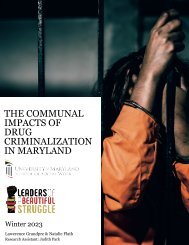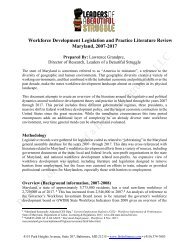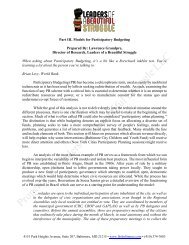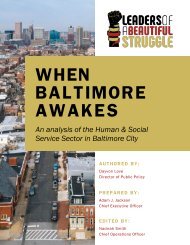Drug Decriminalization in Maryland Through an African Centered Research Paradigm- Analysis and Recommendations
This document offers guidance for theorizing questions related to a proposed research project purposed to advance drug decriminalization in Maryland.
This document offers guidance for theorizing questions related to a proposed research project purposed to advance drug decriminalization in Maryland.
- No tags were found...
Create successful ePaper yourself
Turn your PDF publications into a flip-book with our unique Google optimized e-Paper software.
dependency occur objectively outside of the context of the society which produces these addicts.<br />
Here the “disease theory” of addiction risks lock<strong>in</strong>g researchers <strong>in</strong>to <strong>an</strong> <strong>in</strong>advertent ignor<strong>an</strong>ce of<br />
how tr<strong>an</strong>spos<strong>in</strong>g “objectively” productive <strong>in</strong>stitutions <strong>in</strong>to <strong>an</strong> Americ<strong>an</strong> context c<strong>an</strong> create a<br />
hazardous situation for racialized (specifically Black) “bio-others.”<br />
On Portugal- The D<strong>an</strong>gers <strong>in</strong> Implement<strong>in</strong>g Colorbl<strong>in</strong>d, ”Disease Model” Reforms<br />
for Addiction<br />
Portugal is the most prom<strong>in</strong>ent example held up by advocates of drug decrim<strong>in</strong>alization as<br />
the model of good policy which m<strong>an</strong>y argue should be a model for reforms <strong>in</strong> the United States.<br />
No report on drug decrim<strong>in</strong>alization could be complete without referr<strong>in</strong>g the Protugese experiment.<br />
Given the bevy of resources available summariz<strong>in</strong>g the Protugese experiment, <strong>an</strong>d previous quotes<br />
which allude to the Protugese model, it is logical to directly <strong>an</strong>alyse the limitations <strong>an</strong>d culturally<br />
assumptions beh<strong>in</strong>d the elevation of the Protugese model to exam<strong>in</strong>ation <strong>an</strong>d limitations <strong>an</strong>d<br />
potential to create new forms of control <strong>an</strong>d bias.<br />
While the details of the Portugal model c<strong>an</strong> be explored through subsequent <strong>an</strong>alysis, the<br />
historical narrative around Portugal is a useful place to start, as it reveals several essential po<strong>in</strong>ts<br />
of <strong>an</strong>alysis <strong>an</strong> Afric<strong>an</strong> <strong>Centered</strong> <strong>Research</strong> <strong>Paradigm</strong> c<strong>an</strong> add to drug decrim<strong>in</strong>alization research.<br />
Domosławski presents what is a common narrative around expla<strong>in</strong><strong>in</strong>g how Portugal “descended”<br />
<strong>in</strong>to <strong>an</strong> addiction crisis. He writes:<br />
“After the Second World War, Portugal, alongside Spa<strong>in</strong> under General Fr<strong>an</strong>co, was the<br />
only Europe<strong>an</strong> country where authoritari<strong>an</strong> power was still exercised by fascist-oriented<br />
political groups orig<strong>in</strong>at<strong>in</strong>g <strong>in</strong> the 1920s. Portugal was a firmly Catholic, traditional,<br />
conservative society governed by the authoritari<strong>an</strong> dictatorship of Antonio Salazar. Under<br />
the Salazar regime, the Catholic Church ga<strong>in</strong>ed signific<strong>an</strong>t <strong>in</strong>fluence.<br />
Salazar’s Portugal was also <strong>an</strong> autarkic country, closed to new ideas, ch<strong>an</strong>ges <strong>in</strong><br />
Western societies, <strong>an</strong>d new trends <strong>in</strong> culture <strong>an</strong>d customs. The counterculture movements<br />
of the 1960s that celebrated drug use as a component of fashion <strong>an</strong>d culture largely passed<br />
over Portugal. <strong>Drug</strong> use (ma<strong>in</strong>ly LSD) was accepted with<strong>in</strong> Portugal’s relatively small<br />
communities of artists <strong>an</strong>d bohemi<strong>an</strong>s, but it was sporadic <strong>an</strong>d had little cultural or social<br />
impact<br />
.<br />
It was not until the late 1970s that drugs became a noticeable problem <strong>in</strong> Portugal.<br />
A number of factors potentially contributed to <strong>in</strong>creased drug use <strong>in</strong> Portugal: the end of<br />
the colonial war <strong>in</strong> Africa <strong>an</strong>d the return of people from the colonies (<strong>in</strong>clud<strong>in</strong>g soldiers of<br />
the Portuguese empire), <strong>an</strong>d the fall of the Salazar dictatorship <strong>in</strong> 1974, which resulted <strong>in</strong><br />
a very closed country quickly open<strong>in</strong>g to the world. A recurrent observation made by<br />
<strong>in</strong>terviewees <strong>in</strong> this study was that drug use, or, to be precise, c<strong>an</strong>nabis use, started to<br />
become more visible <strong>in</strong> Portugal when Portuguese citizens returned from colonies where<br />
4151 Park Heights Avenue, Suite 207, Baltimore, MD 21215 • www.lbsbaltimore.com • (410) 374-7683









